unit12 You’re supposed to shake hands[下学期]
文档属性
| 名称 | unit12 You’re supposed to shake hands[下学期] | 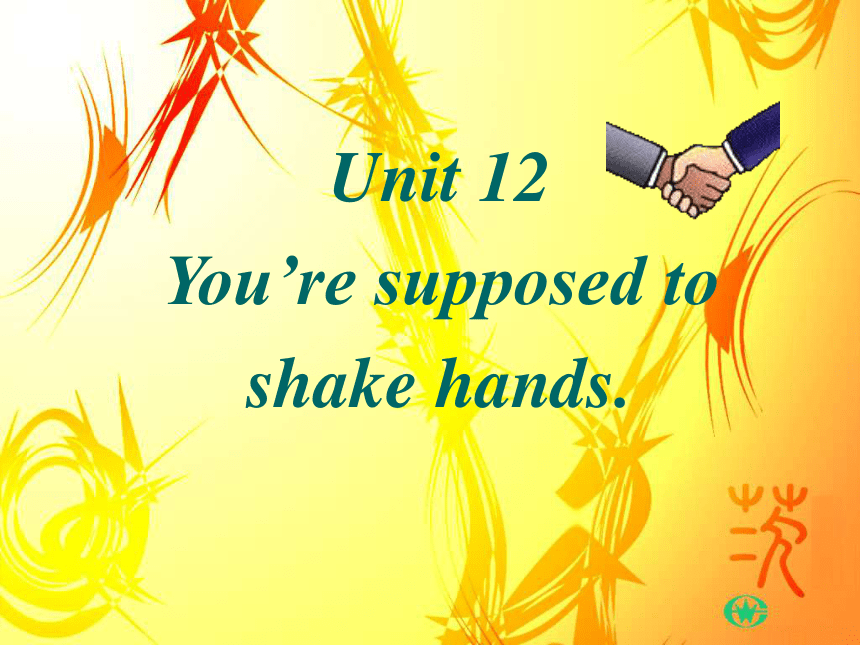 | |
| 格式 | rar | ||
| 文件大小 | 9.2MB | ||
| 资源类型 | 教案 | ||
| 版本资源 | 人教新目标(Go for it)版 | ||
| 科目 | 英语 | ||
| 更新时间 | 2006-12-25 08:04:00 | ||
图片预览

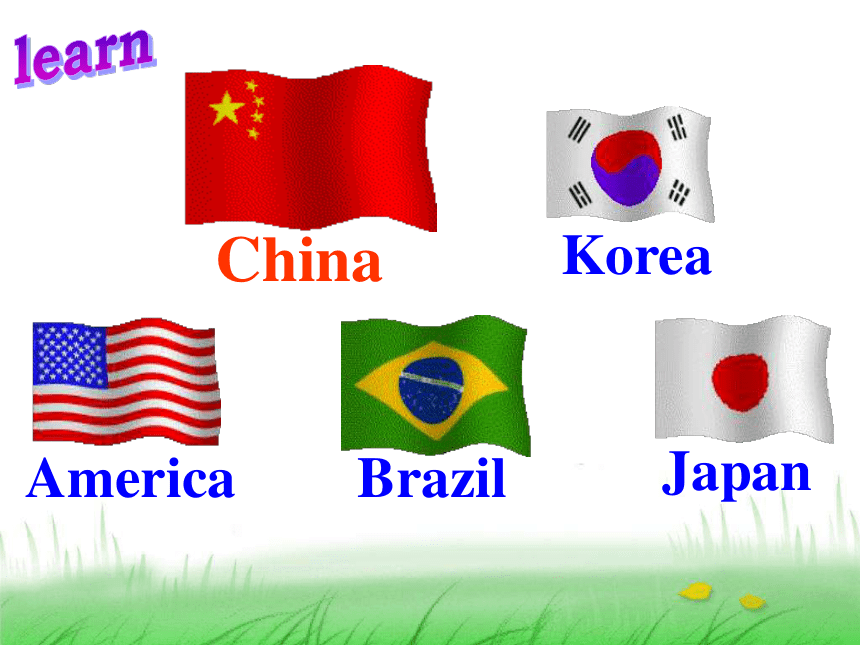
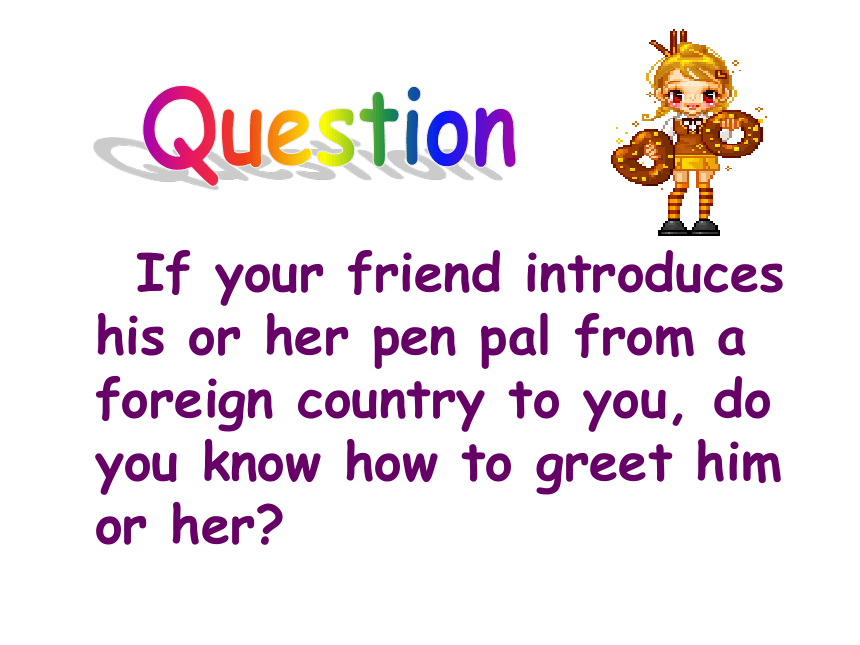
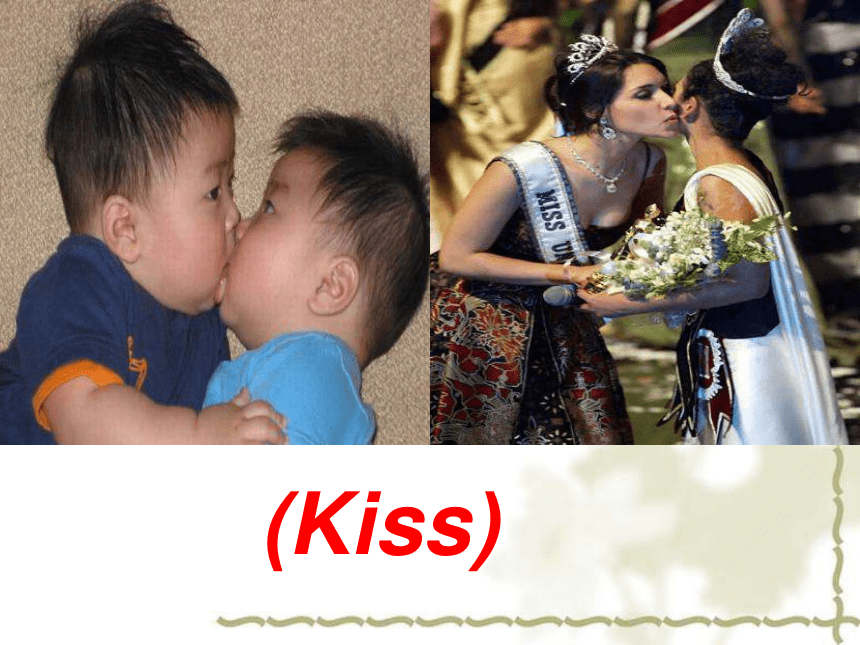
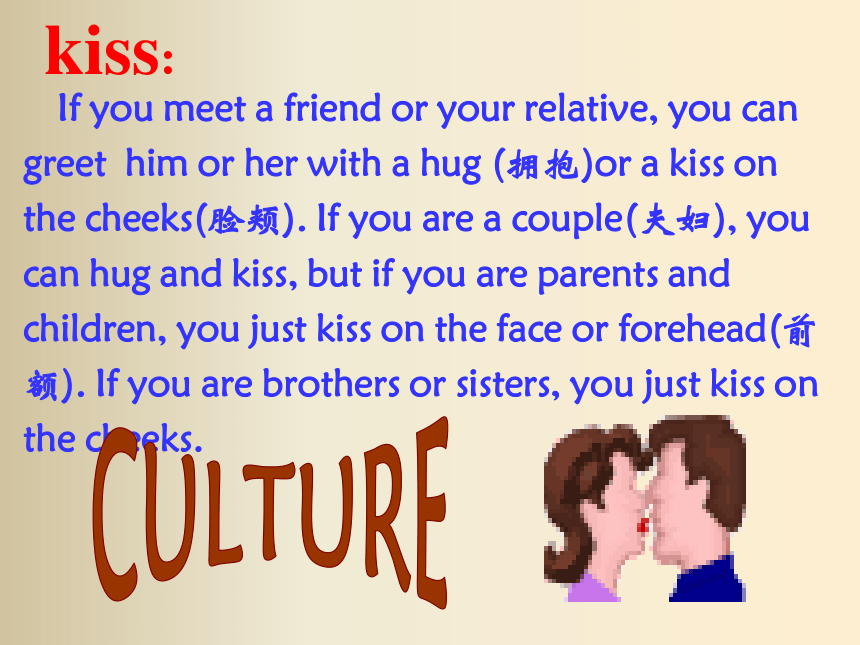
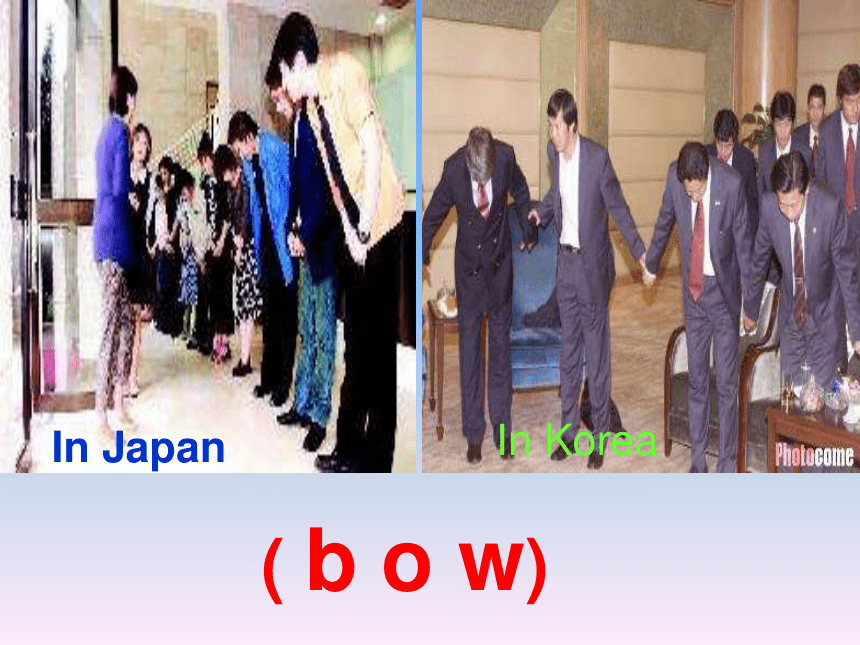
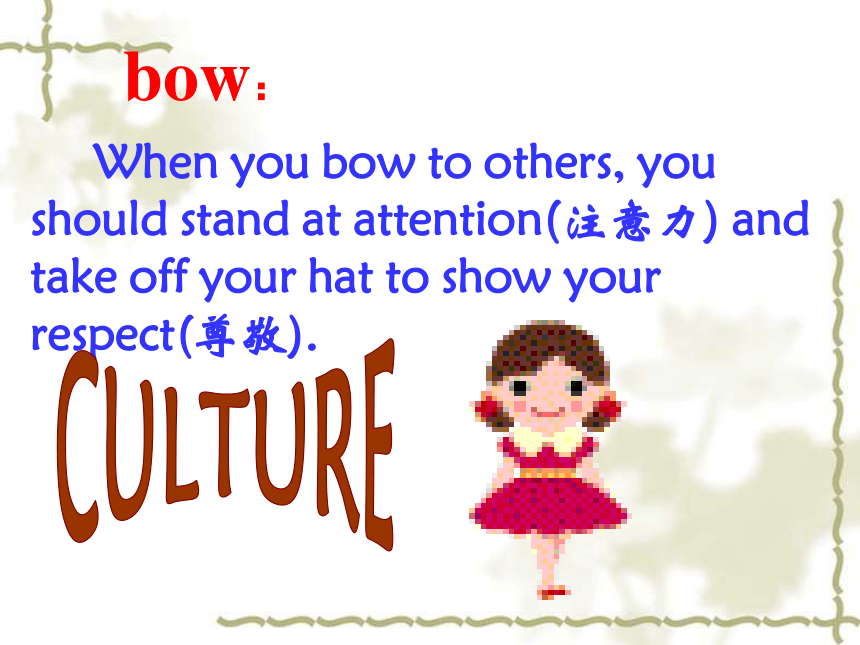
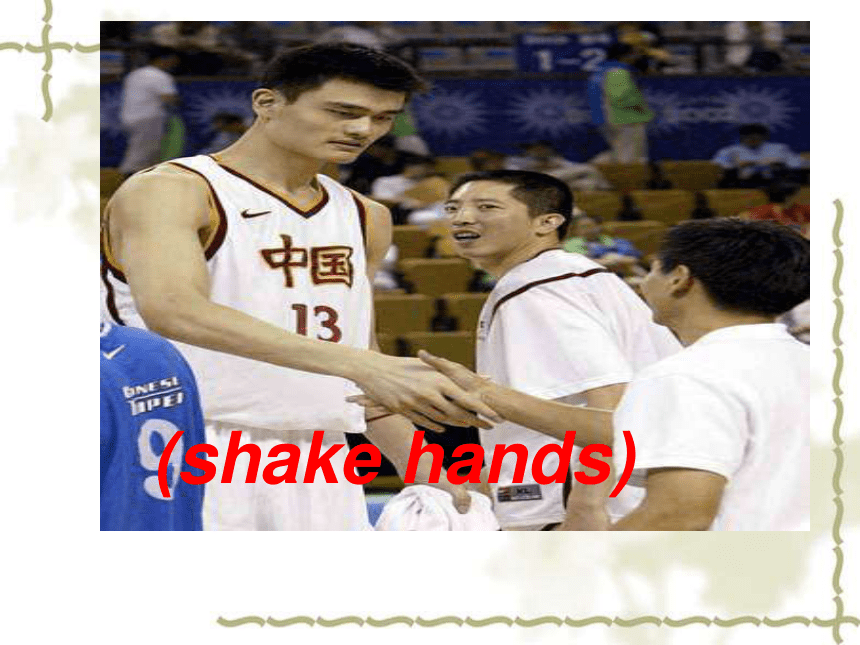
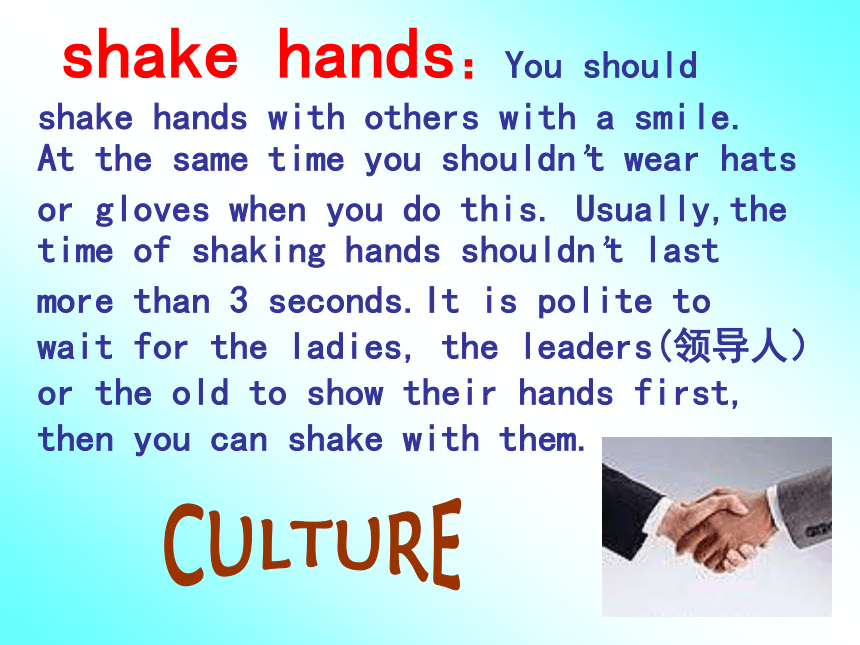
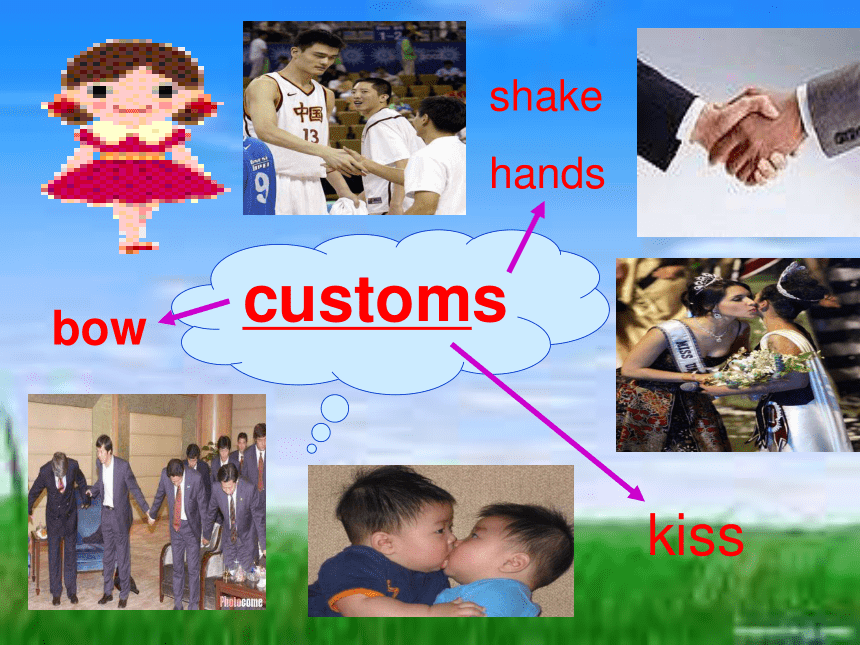
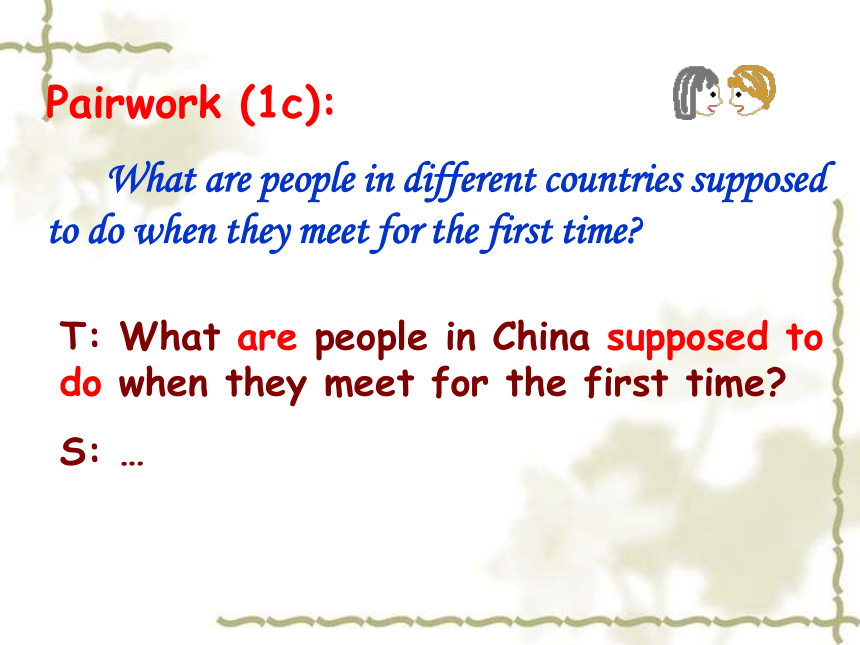
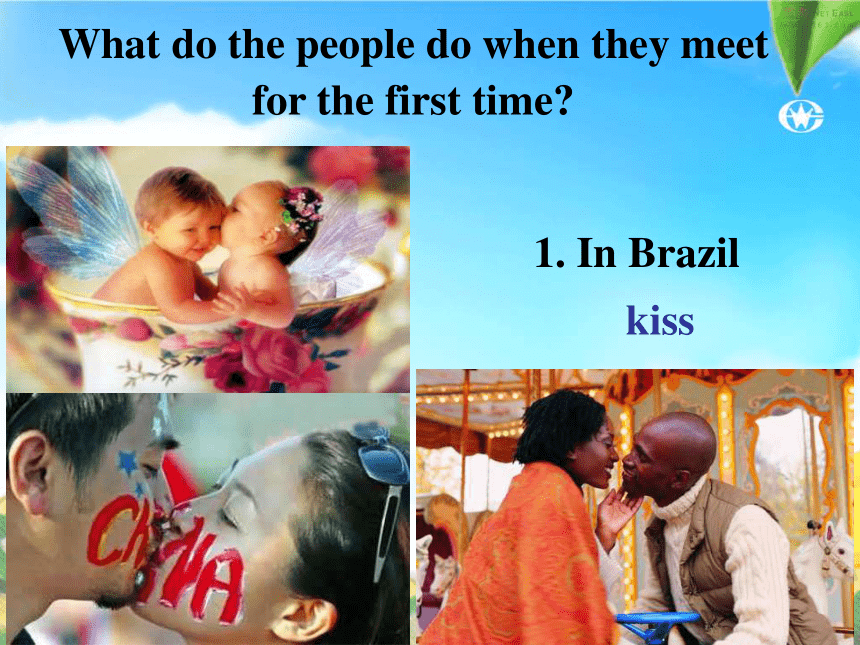
文档简介
课件151张PPT。Unit 12
You’re supposed to shake hands.learnChina Korea America Brazil Japan Question If your friend introduces his or her pen pal from a foreign country to you, do you know how to greet him or her? (Kiss)
If you meet a friend or your relative, you can greet him or her with a hug (拥抱)or a kiss on the cheeks(脸颊). If you are a couple(夫妇), you can hug and kiss, but if you are parents and children, you just kiss on the face or forehead(前额). If you are brothers or sisters, you just kiss on the cheeks.CULTUREkiss:In Japan(bow)In Korea( b o w) When you bow to others, you should stand at attention(注意力) and take off your hat to show your respect(尊敬).bow:CULTURE(shake hands)
?? shake hands:You should shake hands with others with a smile. At the same time you shouldn’t wear hats or gloves when you do this. Usually,the time of shaking hands shouldn’t last more than 3 seconds.It is polite to wait for the ladies, the leaders(领导人) or the old to show their hands first, then you can shake with them.CULTUREcustomsbowshake
handskissPairwork (1c):
What are people in different countries supposed to do when they meet for the first time?T: What are people in China supposed to do when they meet for the first time?
S: …What do the people do when they meet for the first time? 1. In Brazil kiss 2. In the United States what do the
people do when they meet for the
first time?shake hands 3. In Japan what do the people do when they meet for the first time?bow 4. In Mexico what do the people do
when they meet for the first time? 5. In Korea what do the people do when
they meet for the first time? We put hands together in front of the chest.What are people in India supposed to do when they meet for the first time?In you country, what are you supposed to do when you meet someone for the first time?You’re supposed to shakes hands.Language points:
be supposed to do 被期望或要求做…; 应该做…
be not supposed to do 不被许可做…
Everyone is supposed to know the law.
We’re not supposed to play basketball in the classroom.Talent show:
If you meet someone in the following countries, what are you supposed to do? Please show your conversations in pairs.
★ Brazil
★ the United States
★ Japan
★ Mexico
★ Korea
kiss bow shake handsGroupworkWhat are you supposed to do, when you
▼ greet teachers
▼ do homework
▼ phone someone
▼ visit someone’s place
▼ make plans with friends
▼ are on time
▼ give gifts
BrazilKoreaJapanthe United StatesMexicoDifferent countries have
different culture.What do people do when they
meet for the first time?shake handskissbowDifferent countries have different culture.Section A If you meet a friend or your relative, you can greet him or her with a hug or a kiss on the cheeks. If you are a couple, you can hug and kiss, but if you are parents and children, you just kiss on the face or forehead. If you are brothers or sisters, you just kiss on the cheeks.CULTUREkiss:When you bow to others, you should stand at attention and take off your hat to show your respect.CULTUREbow:?? shaking hands:You should shake hands with others with a smile. At the same time you shouldn’t wear hats or gloves when you do this. Usually, the time of shaking hands shouldn’t last no more than 3 seconds. It is polite to wait for the ladies, the leaders or the old to show their hands first, then you can shake with them.CULTURE1b Listeningcbaba2aMaria’s mistakeListeningMaria: I supposed to_______________,
but I arrived at 8:00.
Maria: In my country, it’s different.
When you’re invited for 7:00,
you’re supposed to__________ .
Dan: And you were supposed to
____________ instead.
Dan: I guess you should have asked
what you were supposed to_____. arrive at 7:00come latershake handswearHow was the dinner at Paul’s house last night?Well, it was OK, but I made some mistakes. I was supposed to arrive at 7:00,but I arrived at 8:00.ExerciseWhat are you supposed to do when someone
asks you the way? What are you supposed to do when you
find rubbish everywhere?What are you supposed to do when your
classmate is ill or hurt in hospital?What are you supposed to do when you
see a thief (贼)stealing (偷)someone’s wallet? Grammar Focus:Role play the conversation between Maria
and Dan.How was the dinner at Paul’s house last night?
Well, it was OK, but I made some mistake. I was supposed to arrive at 7:00, but I arrived at 8:00.A:B:PAIRWORKRead the following opinions of a Colombia and
a Swiss student and fill in the chart.being on timeColombiaSwitzerlandPretty relaxed about time.Very important to be on time.visiting a friend’s houseUsually plan to do something
interesting or go somewhere
together.Often just drop by friends house.Never visit a friend’s house
without calling first.making plans with friendsDon’t usually have to make plans
to meet friends.Role play the conversation between Teresa
and Marc.What kinds of rules do they have in
Colombia?
Well, they have pretty relaxed rules.
Like what?
Well, it’s OK if you’re not on time.A:B:PAIRWORKA:B:PAIRWORKIn China, what is supposed to do in these following situations?1. greeting teachers say, “Good morning.”2. doing homework 3. phoning someone 4. visiting someone’s
place call first, and knock
at the doorat home or in school
after classsay, “Hello, I’m….”5. making plans with
friends PAIRWORKIn China, what is supposed to do in these following situations?6. being on time 7. giving gifts Discuss the plan, call
to make changes.Always on time or
litter early.Festival gifts being
necessary.3a ReadingWe are pretty relax about time.We often just drop by our friends’ homes.We don’t have to make
plans when we get
together with friends.It’s very important to be on time.We never visit a friend’s house without calling first.We usually make plans to meet friends.What kind of rules do you have in Colombia?Well, they have pretty relaxed rules. Like what?Well, it’s OK if you’re not on time.Pairwork A:What are people in China
supposed to do when they meet
for the first time?
B:They’re supposed to shake hands.应该Pairwork A:What are people in Korea
supposed to do when they meet
for the first time?
B:They’re supposed to bow.鞠躬A:What are people in …supposed
to do when they meet for the first time?
B:They’re supposed to ….A:What are you supposed to do at
school?
B:We’re supposed to be on time,
but we’re not supposed to be late.A:What are you supposed to do at
school?
B:We’re supposed to be on time,
but we’re not supposed to be late.A:How was Jim’s party last night?
B:Oh, it was a disaster.
A:What happened?
B:I was supposed to arrive at 7:00,
but I arrived at 8:00 . 灾难A:How was Jim’s party last night?
B:Oh, it was a disaster.
A:What happened?
B:I was supposed to shake hands
with his mum, but I kissed her . A:How was Jim’s party last night?
B:Oh, it was a disaster.
A:What happened?
B:I was supposed to …, but I… . A:How …Jim’s…?
B:Oh, … disaster.
A:What …?
B:I was supposed to … , but I … . A:I don’t know how to behave at
the Japanese dinner table?
B:Let me tell you. You’re supposed
to make noise when you’re eating,
especially when you’re eating
noodles. Pairwork chopsticksA:Could you give me a lesson on
Japanese table manners?
B:Sure. You’re not supposed to
stick the chopsticks into your food. Pairwork 插knifeforkspoonWhen you eat in a western restaurant, you’re supposed to…, but you’re not….
You should…, but you shouldn’t….
It’s polite to…, but it’s rude to….reportSection BTable MannersThere are many table manners
around the world. But different
countries have different culture.
…… Table MannersYou are supposed to pick up your bowl of rice.Table MannersYou’re supposed not to eat with your hands.Table MannersYou’re supposed not to talk at the table.Table MannersThe youngest person is not supposed to start
eating first.How much do you know
about table manners around
the world?In the United States, you’re not
supposed to eat with your hands.
2.In Peru, you are not supposed to
talk at the table.
3.In China, you’re not supposed to
pick up your bowl of rice.
4.In Korea, the youngest person is
supposed to start eating first.
5.In Brazil, you should wipe your mouth
with your napkin every time you take a
drink.?FFFTIn the United States, you’re not supposed to eat with your hands.∨In PeruYou’re not supposed to
talk at the table.×In China, you’re not supposed to pick up your bowl of rice.×In Korea, the youngest person
is supposed to start
eating first.×In Brazil, you should wipe your mouth with your napkin every time you take a drink.∨Manners in Japan! Please fill in the blanks.You aren’t supposed to _____________.
You shouldn’t _____________________.
It’s rude ________________________.
It’s polite _______________________. eat or drink while walking down the street point at anyone with your chopsticks to stick your chopsticks into your food to make noise while eating noodlesIn Japanmake noise while eating noodlesIn Japaneat or drink while walking down the streetIn Japanstick your chopsticks into your foodIn Japanpoint at anyone with your chopsticks2a Listening243—1.You aren’t supposed to
__2.It’s polite…
__3.It’s rude…
__4. You shouldn’t…2b ListeningabcdListen and match these sentence parts.You aren’t supposed to…
It’s polite…
It’s rude…
You shouldn’t…b. to stick your chopsticks into your food.a. to make noise while eating noodles.d. eat or drink while walking down the street.c. point at anyone with your chopsticks.You aren’t supposed to eat or drink while walking down the street. It’s polite to make noise while eating noodles. PAIRWORKA: We’re supposed to …
B: Yes, and it’s rude to …1.Why was Wang Kin nervous before she arrived in France?Her French was not very good.3a ReadingBecause she had no idea of the life in France.2. Why did she have no reason to be nervous?Her host family was really nice.Because her host family is really nice. They go out their way to make her feel at home.3.What differences have occurred in her French?Her French has improved.Her French has improved greatly. She’s very comfortabe speaking French now.4. What does she find surprising?You put your bread on the tables not on the plate.“You’re not supposed to put your bread on your plate. You’re supposed to put it on the table.”5. What is one particular challenge she is facing?One particular challenge is learning how to behave at the dinner table.3a 1.table manners
2.go out of one’s way to do sth.
3.feel(be) at home
4.be(get) used to (doing) sth.
5.cut up
6.make a toast
7.(give sb. a toast)1.餐桌礼仪
2.特意,专门,尽力做某事
3.随便,无拘束,自由自在
4.习惯于(做)某事
5.切开,切碎
6.敬酒
7.给某人敬酒3aRead the e-mail and make a list of table manners in France!Talk in groups!4 Now you are a Chinese guide, a group of visitors from the USA are coming.
Make a list of things people are supposed to do in different situations!GROUPWORKeating meals with other people
making appointments
giving compliments
introducing other people
making a toast at dinner
offering tea
speaking to older peopleHomeworkFill in the blanks in self-check 1.
Write an e-mail to solve Fan Ling’s problems!
(self-check 2)CULTURE1.When you are invited to dinner by Americans, the hostess expects you to be there on time or not more than a few minutes later.
2.When the guests sit down at a dinner table, it is common for the men to help ladies by pushing their chairs under them. Some families have a habit of offering a prayer of thanks before they eat.
3.Europeans keep the knife on the right hand, the fork on the left. But Americans use just one hand, and keep the other one on the lap. They constantly change their fork to the left hand when they have to cut meat.4. You should leave a spoon to lie flat. (a coffee spoon on the saucer, a soup spoon on the service plate beside the soup bowl.)
5.When Americans eat the bread, they hold it in their fingers, usually break it first.
6.If you have to leave during the meal, you should ask the hostess, “Would you please excuse me for a minute?” After the meal, you needn’t fold the napkins unless you are house guests and want to stay for more than one meal.
7.When you leave, it is a custom for you to say: “Goodbye. It was so nice of you to have me.” or “Thank you. I’ve had a nice time.” Then, maybe you can send a thank-you note.CULTURE3b
Here are some things you need to know about table manners when you visit Japan, First of all, you should remember: sometimes it’s polite to make noise when you’re eating ,especially when you’re eating noodles. It shows that you like the food. Second, it’s rude to stick your chopsticks into your food. And you shouldn’t point at anyone with your chopsticks. Finally, this isn’t about table manners exactly, but you should know that it’s rude to eat or drink while walking down the street.4 GroupworkHow can you help visitors to China? Make a list of things people are supposed to do in these different situations. eating meals with other people
giving compliments
introducing other people
making a toast at dinner
making appointments
offering tea
speaking to older peopleWriting
Table Manners in China Talking about eating habit, unlike the West, where everyone has their own plate of food, in China the dishes are placed on the table and everybody shares. Chinese are very proud of their culture of cuisine and will do their best to show their hospitality. And sometimes the host will serve some dishes with his or her own chopsticks to guests to show his or her hospitality. This is a sign of politeness. The appropriate thing to
do would be to eat the
whatever-it-is and
say how yummy it is. If you feel uncomfortable with this, you can just say a polite "thank you" and leave the food there. There some other rules that are suggested you follow to make your stay in China happier, though you will be forgiven if you have no idea of what they are. 1. Never stick your chopsticks upright in the rice bowl, lay them on your dish instead. Otherwise, it is deemed extremely impolite to the host and seniors present. The reason for this is that when somebody
dies, the shrine to them
contains a bowl of sand or rice with two sticks of incense stuck upright in it. So if you stick your chopsticks in the rice bowl, it looks like the shrine and is equivalent to wishing death upon a person at the table. 2. Make sure the spout of the teapot is not facing anyone. It is impolite to set the teapot down where the spout is facing towards somebody. The spout should always be directed
to where nobody is sitting,
usually just outward from
the table. 3. Don't tap on your bowl with your chopsticks, since that will be deemed insult to the host or the chef. Beggars tap on their bowls, and also, when the food is coming too slow in a restaurant, people will tap their bowls. If
you are in someone's
home, it is like insulting
the host or the cook. 4. Never try to turn a fish over and debone it yourself, since the separation of the fish skeleton from the lower half of the flesh will usually be performed by the host or a waiter. Superstitious people deem bad luck will ensue and a fishing boat will capsize if you do so. This is especially true to southerners in China (to be specific, such as Guangdong, Guangxi and Fujian provinces, etc.), since, traditionally, southerners are the fishing population. Put the following phrases in the
correct blanks.Exercise 1make noise while eating
point at others with chopstick
say hello to others
wipe your mouth after dinner
talk loudly at the tableIt’s rude to …It’s polite to ... 6. kiss or shake hands
7. meet without saying anything
8. arrive too late
9. shake hands when you first meet
someone
10. eat while walking in the streetExercise 2 根据提示词列举出几条作为学生在家
或在学校等应该做和不应该做的。
(参照所给句型,尽量选用不同句型。)smoke
do our homework
get our ears pierced
speak aloud in/on…
be polite to…
clean upstay up
be home by…
drive a car
wash the dishes
bring snakes to the classroom
choose our own clothesmake the bed by ourselves
run in the hallways
be late for school参考句型:
We are supposed to…/
We are not supposed to
We should / shouldn’t…
It’s polite/ rude to…We are allowed to…
/ We aren’t allowed to…
We can/ could/ can’t/ couldn’t…
Things we are supposed to do:Things we are supposed to do:
___________________________________________________________________________
___________________________________________________________________________
___________________________________________________________________________
___________________________________________________________________________
___________________________________________________________________________Things we aren’t supposed to do:
____________________________________________________________________________
____________________________________________________________________________
____________________________________________________________________________
____________________________________________________________________________
____________________________________________________________________________1.People in Japan and people in America_____________ differently at the dinner table.
2.You can__________ how different the table manners here are from ours.
3.In Singapore, the trains always __________ on time .They are never late.
4.On Chinese New Year, people like to _________ time with their families.
5.I usually__________ my friends in the library on Friday nights.behaveimaginearrivespendmeetSelf check arrive meet spend behave imagine3 Down
1.Japanese and Korean do this when they meet people.
2.Americans do this with their hands when they meet people.
3.Brazilian do this in Brazil when they meet.
Across
4.You eat with these in Japan, Korea, and China.
5.You cut your food with this in the United States.bow shakekisschopsticksknifeHow R U?
CU
BTW
CUL8rHow are you?See you!By the waySee you later1aYou’re supposed to write quickly!Section 1 Before you read1bIC
RUOK
ASAP
DIY
THX
I see
Are you OK?
as soon as possible
Do it yourself
Thanks
Reading Section 3 3aCSL(can’t stop laughing)CUL8r(see you later)I had a gr8 weekend & uO-no! I’m going 2BL8 ?I’ve Cn that movie 4XS, it’s gr8. ?Xqz me, cd U pls help me?e-mail English is a new kind of written English that is being used to save time. meaning abbreviations
homophone
punctuation markse-mail English types3a Can you write an example of each on your own ?1a~1b How R U? How are you?
CU See you!
BTW By the way.
CUL8r See you later! BRB
CU2morrow
ASAPI’ll be right back.
See you tomorrow!
as soon as possiblePlease write more expressions like the ones above! situationse-mail English is supposed to be used______________.
is not supposed to be used___________. on a mobile phone in classCo-operative Time!Section 4Complete the chart and discuss your answers with your partner.Reading P100你了解网络聊天的表情含义吗?高兴愤怒COOL 闭嘴 害羞 传情 冷笑 呐喊 Thank you for listening!
You’re supposed to shake hands.learnChina Korea America Brazil Japan Question If your friend introduces his or her pen pal from a foreign country to you, do you know how to greet him or her? (Kiss)
If you meet a friend or your relative, you can greet him or her with a hug (拥抱)or a kiss on the cheeks(脸颊). If you are a couple(夫妇), you can hug and kiss, but if you are parents and children, you just kiss on the face or forehead(前额). If you are brothers or sisters, you just kiss on the cheeks.CULTUREkiss:In Japan(bow)In Korea( b o w) When you bow to others, you should stand at attention(注意力) and take off your hat to show your respect(尊敬).bow:CULTURE(shake hands)
?? shake hands:You should shake hands with others with a smile. At the same time you shouldn’t wear hats or gloves when you do this. Usually,the time of shaking hands shouldn’t last more than 3 seconds.It is polite to wait for the ladies, the leaders(领导人) or the old to show their hands first, then you can shake with them.CULTUREcustomsbowshake
handskissPairwork (1c):
What are people in different countries supposed to do when they meet for the first time?T: What are people in China supposed to do when they meet for the first time?
S: …What do the people do when they meet for the first time? 1. In Brazil kiss 2. In the United States what do the
people do when they meet for the
first time?shake hands 3. In Japan what do the people do when they meet for the first time?bow 4. In Mexico what do the people do
when they meet for the first time? 5. In Korea what do the people do when
they meet for the first time? We put hands together in front of the chest.What are people in India supposed to do when they meet for the first time?In you country, what are you supposed to do when you meet someone for the first time?You’re supposed to shakes hands.Language points:
be supposed to do 被期望或要求做…; 应该做…
be not supposed to do 不被许可做…
Everyone is supposed to know the law.
We’re not supposed to play basketball in the classroom.Talent show:
If you meet someone in the following countries, what are you supposed to do? Please show your conversations in pairs.
★ Brazil
★ the United States
★ Japan
★ Mexico
★ Korea
kiss bow shake handsGroupworkWhat are you supposed to do, when you
▼ greet teachers
▼ do homework
▼ phone someone
▼ visit someone’s place
▼ make plans with friends
▼ are on time
▼ give gifts
BrazilKoreaJapanthe United StatesMexicoDifferent countries have
different culture.What do people do when they
meet for the first time?shake handskissbowDifferent countries have different culture.Section A If you meet a friend or your relative, you can greet him or her with a hug or a kiss on the cheeks. If you are a couple, you can hug and kiss, but if you are parents and children, you just kiss on the face or forehead. If you are brothers or sisters, you just kiss on the cheeks.CULTUREkiss:When you bow to others, you should stand at attention and take off your hat to show your respect.CULTUREbow:?? shaking hands:You should shake hands with others with a smile. At the same time you shouldn’t wear hats or gloves when you do this. Usually, the time of shaking hands shouldn’t last no more than 3 seconds. It is polite to wait for the ladies, the leaders or the old to show their hands first, then you can shake with them.CULTURE1b Listeningcbaba2aMaria’s mistakeListeningMaria: I supposed to_______________,
but I arrived at 8:00.
Maria: In my country, it’s different.
When you’re invited for 7:00,
you’re supposed to__________ .
Dan: And you were supposed to
____________ instead.
Dan: I guess you should have asked
what you were supposed to_____. arrive at 7:00come latershake handswearHow was the dinner at Paul’s house last night?Well, it was OK, but I made some mistakes. I was supposed to arrive at 7:00,but I arrived at 8:00.ExerciseWhat are you supposed to do when someone
asks you the way? What are you supposed to do when you
find rubbish everywhere?What are you supposed to do when your
classmate is ill or hurt in hospital?What are you supposed to do when you
see a thief (贼)stealing (偷)someone’s wallet? Grammar Focus:Role play the conversation between Maria
and Dan.How was the dinner at Paul’s house last night?
Well, it was OK, but I made some mistake. I was supposed to arrive at 7:00, but I arrived at 8:00.A:B:PAIRWORKRead the following opinions of a Colombia and
a Swiss student and fill in the chart.being on timeColombiaSwitzerlandPretty relaxed about time.Very important to be on time.visiting a friend’s houseUsually plan to do something
interesting or go somewhere
together.Often just drop by friends house.Never visit a friend’s house
without calling first.making plans with friendsDon’t usually have to make plans
to meet friends.Role play the conversation between Teresa
and Marc.What kinds of rules do they have in
Colombia?
Well, they have pretty relaxed rules.
Like what?
Well, it’s OK if you’re not on time.A:B:PAIRWORKA:B:PAIRWORKIn China, what is supposed to do in these following situations?1. greeting teachers say, “Good morning.”2. doing homework 3. phoning someone 4. visiting someone’s
place call first, and knock
at the doorat home or in school
after classsay, “Hello, I’m….”5. making plans with
friends PAIRWORKIn China, what is supposed to do in these following situations?6. being on time 7. giving gifts Discuss the plan, call
to make changes.Always on time or
litter early.Festival gifts being
necessary.3a ReadingWe are pretty relax about time.We often just drop by our friends’ homes.We don’t have to make
plans when we get
together with friends.It’s very important to be on time.We never visit a friend’s house without calling first.We usually make plans to meet friends.What kind of rules do you have in Colombia?Well, they have pretty relaxed rules. Like what?Well, it’s OK if you’re not on time.Pairwork A:What are people in China
supposed to do when they meet
for the first time?
B:They’re supposed to shake hands.应该Pairwork A:What are people in Korea
supposed to do when they meet
for the first time?
B:They’re supposed to bow.鞠躬A:What are people in …supposed
to do when they meet for the first time?
B:They’re supposed to ….A:What are you supposed to do at
school?
B:We’re supposed to be on time,
but we’re not supposed to be late.A:What are you supposed to do at
school?
B:We’re supposed to be on time,
but we’re not supposed to be late.A:How was Jim’s party last night?
B:Oh, it was a disaster.
A:What happened?
B:I was supposed to arrive at 7:00,
but I arrived at 8:00 . 灾难A:How was Jim’s party last night?
B:Oh, it was a disaster.
A:What happened?
B:I was supposed to shake hands
with his mum, but I kissed her . A:How was Jim’s party last night?
B:Oh, it was a disaster.
A:What happened?
B:I was supposed to …, but I… . A:How …Jim’s…?
B:Oh, … disaster.
A:What …?
B:I was supposed to … , but I … . A:I don’t know how to behave at
the Japanese dinner table?
B:Let me tell you. You’re supposed
to make noise when you’re eating,
especially when you’re eating
noodles. Pairwork chopsticksA:Could you give me a lesson on
Japanese table manners?
B:Sure. You’re not supposed to
stick the chopsticks into your food. Pairwork 插knifeforkspoonWhen you eat in a western restaurant, you’re supposed to…, but you’re not….
You should…, but you shouldn’t….
It’s polite to…, but it’s rude to….reportSection BTable MannersThere are many table manners
around the world. But different
countries have different culture.
…… Table MannersYou are supposed to pick up your bowl of rice.Table MannersYou’re supposed not to eat with your hands.Table MannersYou’re supposed not to talk at the table.Table MannersThe youngest person is not supposed to start
eating first.How much do you know
about table manners around
the world?In the United States, you’re not
supposed to eat with your hands.
2.In Peru, you are not supposed to
talk at the table.
3.In China, you’re not supposed to
pick up your bowl of rice.
4.In Korea, the youngest person is
supposed to start eating first.
5.In Brazil, you should wipe your mouth
with your napkin every time you take a
drink.?FFFTIn the United States, you’re not supposed to eat with your hands.∨In PeruYou’re not supposed to
talk at the table.×In China, you’re not supposed to pick up your bowl of rice.×In Korea, the youngest person
is supposed to start
eating first.×In Brazil, you should wipe your mouth with your napkin every time you take a drink.∨Manners in Japan! Please fill in the blanks.You aren’t supposed to _____________.
You shouldn’t _____________________.
It’s rude ________________________.
It’s polite _______________________. eat or drink while walking down the street point at anyone with your chopsticks to stick your chopsticks into your food to make noise while eating noodlesIn Japanmake noise while eating noodlesIn Japaneat or drink while walking down the streetIn Japanstick your chopsticks into your foodIn Japanpoint at anyone with your chopsticks2a Listening243—1.You aren’t supposed to
__2.It’s polite…
__3.It’s rude…
__4. You shouldn’t…2b ListeningabcdListen and match these sentence parts.You aren’t supposed to…
It’s polite…
It’s rude…
You shouldn’t…b. to stick your chopsticks into your food.a. to make noise while eating noodles.d. eat or drink while walking down the street.c. point at anyone with your chopsticks.You aren’t supposed to eat or drink while walking down the street. It’s polite to make noise while eating noodles. PAIRWORKA: We’re supposed to …
B: Yes, and it’s rude to …1.Why was Wang Kin nervous before she arrived in France?Her French was not very good.3a ReadingBecause she had no idea of the life in France.2. Why did she have no reason to be nervous?Her host family was really nice.Because her host family is really nice. They go out their way to make her feel at home.3.What differences have occurred in her French?Her French has improved.Her French has improved greatly. She’s very comfortabe speaking French now.4. What does she find surprising?You put your bread on the tables not on the plate.“You’re not supposed to put your bread on your plate. You’re supposed to put it on the table.”5. What is one particular challenge she is facing?One particular challenge is learning how to behave at the dinner table.3a 1.table manners
2.go out of one’s way to do sth.
3.feel(be) at home
4.be(get) used to (doing) sth.
5.cut up
6.make a toast
7.(give sb. a toast)1.餐桌礼仪
2.特意,专门,尽力做某事
3.随便,无拘束,自由自在
4.习惯于(做)某事
5.切开,切碎
6.敬酒
7.给某人敬酒3aRead the e-mail and make a list of table manners in France!Talk in groups!4 Now you are a Chinese guide, a group of visitors from the USA are coming.
Make a list of things people are supposed to do in different situations!GROUPWORKeating meals with other people
making appointments
giving compliments
introducing other people
making a toast at dinner
offering tea
speaking to older peopleHomeworkFill in the blanks in self-check 1.
Write an e-mail to solve Fan Ling’s problems!
(self-check 2)CULTURE1.When you are invited to dinner by Americans, the hostess expects you to be there on time or not more than a few minutes later.
2.When the guests sit down at a dinner table, it is common for the men to help ladies by pushing their chairs under them. Some families have a habit of offering a prayer of thanks before they eat.
3.Europeans keep the knife on the right hand, the fork on the left. But Americans use just one hand, and keep the other one on the lap. They constantly change their fork to the left hand when they have to cut meat.4. You should leave a spoon to lie flat. (a coffee spoon on the saucer, a soup spoon on the service plate beside the soup bowl.)
5.When Americans eat the bread, they hold it in their fingers, usually break it first.
6.If you have to leave during the meal, you should ask the hostess, “Would you please excuse me for a minute?” After the meal, you needn’t fold the napkins unless you are house guests and want to stay for more than one meal.
7.When you leave, it is a custom for you to say: “Goodbye. It was so nice of you to have me.” or “Thank you. I’ve had a nice time.” Then, maybe you can send a thank-you note.CULTURE3b
Here are some things you need to know about table manners when you visit Japan, First of all, you should remember: sometimes it’s polite to make noise when you’re eating ,especially when you’re eating noodles. It shows that you like the food. Second, it’s rude to stick your chopsticks into your food. And you shouldn’t point at anyone with your chopsticks. Finally, this isn’t about table manners exactly, but you should know that it’s rude to eat or drink while walking down the street.4 GroupworkHow can you help visitors to China? Make a list of things people are supposed to do in these different situations. eating meals with other people
giving compliments
introducing other people
making a toast at dinner
making appointments
offering tea
speaking to older peopleWriting
Table Manners in China Talking about eating habit, unlike the West, where everyone has their own plate of food, in China the dishes are placed on the table and everybody shares. Chinese are very proud of their culture of cuisine and will do their best to show their hospitality. And sometimes the host will serve some dishes with his or her own chopsticks to guests to show his or her hospitality. This is a sign of politeness. The appropriate thing to
do would be to eat the
whatever-it-is and
say how yummy it is. If you feel uncomfortable with this, you can just say a polite "thank you" and leave the food there. There some other rules that are suggested you follow to make your stay in China happier, though you will be forgiven if you have no idea of what they are. 1. Never stick your chopsticks upright in the rice bowl, lay them on your dish instead. Otherwise, it is deemed extremely impolite to the host and seniors present. The reason for this is that when somebody
dies, the shrine to them
contains a bowl of sand or rice with two sticks of incense stuck upright in it. So if you stick your chopsticks in the rice bowl, it looks like the shrine and is equivalent to wishing death upon a person at the table. 2. Make sure the spout of the teapot is not facing anyone. It is impolite to set the teapot down where the spout is facing towards somebody. The spout should always be directed
to where nobody is sitting,
usually just outward from
the table. 3. Don't tap on your bowl with your chopsticks, since that will be deemed insult to the host or the chef. Beggars tap on their bowls, and also, when the food is coming too slow in a restaurant, people will tap their bowls. If
you are in someone's
home, it is like insulting
the host or the cook. 4. Never try to turn a fish over and debone it yourself, since the separation of the fish skeleton from the lower half of the flesh will usually be performed by the host or a waiter. Superstitious people deem bad luck will ensue and a fishing boat will capsize if you do so. This is especially true to southerners in China (to be specific, such as Guangdong, Guangxi and Fujian provinces, etc.), since, traditionally, southerners are the fishing population. Put the following phrases in the
correct blanks.Exercise 1make noise while eating
point at others with chopstick
say hello to others
wipe your mouth after dinner
talk loudly at the tableIt’s rude to …It’s polite to ... 6. kiss or shake hands
7. meet without saying anything
8. arrive too late
9. shake hands when you first meet
someone
10. eat while walking in the streetExercise 2 根据提示词列举出几条作为学生在家
或在学校等应该做和不应该做的。
(参照所给句型,尽量选用不同句型。)smoke
do our homework
get our ears pierced
speak aloud in/on…
be polite to…
clean upstay up
be home by…
drive a car
wash the dishes
bring snakes to the classroom
choose our own clothesmake the bed by ourselves
run in the hallways
be late for school参考句型:
We are supposed to…/
We are not supposed to
We should / shouldn’t…
It’s polite/ rude to…We are allowed to…
/ We aren’t allowed to…
We can/ could/ can’t/ couldn’t…
Things we are supposed to do:Things we are supposed to do:
___________________________________________________________________________
___________________________________________________________________________
___________________________________________________________________________
___________________________________________________________________________
___________________________________________________________________________Things we aren’t supposed to do:
____________________________________________________________________________
____________________________________________________________________________
____________________________________________________________________________
____________________________________________________________________________
____________________________________________________________________________1.People in Japan and people in America_____________ differently at the dinner table.
2.You can__________ how different the table manners here are from ours.
3.In Singapore, the trains always __________ on time .They are never late.
4.On Chinese New Year, people like to _________ time with their families.
5.I usually__________ my friends in the library on Friday nights.behaveimaginearrivespendmeetSelf check arrive meet spend behave imagine3 Down
1.Japanese and Korean do this when they meet people.
2.Americans do this with their hands when they meet people.
3.Brazilian do this in Brazil when they meet.
Across
4.You eat with these in Japan, Korea, and China.
5.You cut your food with this in the United States.bow shakekisschopsticksknifeHow R U?
CU
BTW
CUL8rHow are you?See you!By the waySee you later1aYou’re supposed to write quickly!Section 1 Before you read1bIC
RUOK
ASAP
DIY
THX
I see
Are you OK?
as soon as possible
Do it yourself
Thanks
Reading Section 3 3aCSL(can’t stop laughing)CUL8r(see you later)I had a gr8 weekend & uO-no! I’m going 2BL8 ?I’ve Cn that movie 4XS, it’s gr8. ?Xqz me, cd U pls help me?e-mail English is a new kind of written English that is being used to save time. meaning abbreviations
homophone
punctuation markse-mail English types3a Can you write an example of each on your own ?1a~1b How R U? How are you?
CU See you!
BTW By the way.
CUL8r See you later! BRB
CU2morrow
ASAPI’ll be right back.
See you tomorrow!
as soon as possiblePlease write more expressions like the ones above! situationse-mail English is supposed to be used______________.
is not supposed to be used___________. on a mobile phone in classCo-operative Time!Section 4Complete the chart and discuss your answers with your partner.Reading P100你了解网络聊天的表情含义吗?高兴愤怒COOL 闭嘴 害羞 传情 冷笑 呐喊 Thank you for listening!
同课章节目录
- Unit 1 How can we become good learners.
- Section A
- Section B
- Unit 2 I think that mooncakes are delicious!
- Section A
- Section B
- Unit 3 Could you please tell me where the restroom
- Section A
- Section B
- Unit 4 I used to be afraid of the dark.
- Section A
- Section B
- Unit 5 What are the shirts made of?
- Section A
- Section B
- Review of Units 1-5
- Unit 6 When was it invented?
- Section A
- Section B
- Unit 7 Teenagers should be allowed to choose their
- Section A
- Section B
- Unit 8 It must belong to Carla.
- Section A
- Section B
- Unit 9 I like music that I can dance to.
- Section A
- Section B
- Unit 10 You're supposed to shake hands.
- Section A
- Section B
- Review of Units 6-10
- Unit 11 Sad movies make me cry.
- Section A
- Section B
- Unit 12 Life is full of the unexpected
- Section A
- Section B
- Unit 13 We're trying to save the earth!
- Section A
- Section B
- Unit 14 I remember meeting all of you in Grade 7.
- Section A
- Section B
- Review of Units 11-14
